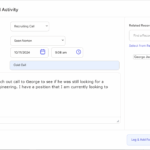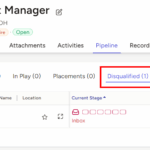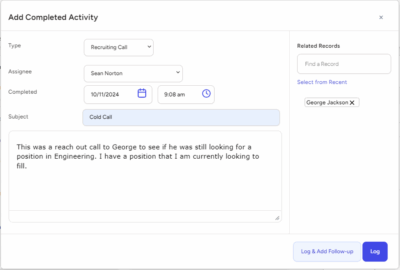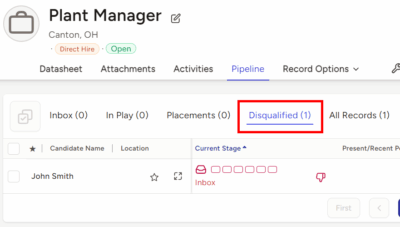In the fast-paced world of professional recruiting and talent acquisition, the candidate experience has emerged as a critical factor that significantly influences an organization’s ability to attract and retain top-tier talent. A positive candidate experience not only enhances the employer brand but also contributes to long-term success by fostering a culture of respect and transparency.
This blog post will examine the multifaceted aspects of the candidate experience during the recruiting and hiring process, exploring the challenges faced by recruiters and search consultants and proposing strategic solutions to overcome these hurdles.
Understanding the Candidate Perspective
In the realm of talent acquisition, the candidate experience holds significant weight. As a professional recruiter or search consultant, grasping the intricacies of this journey is not only crucial but indispensable. The candidate experience embodies the essence of a company’s brand and culture, influencing the recruitment process’s success and the organization’s reputation in the job market. In this exploration, we delve into the importance of comprehending the candidate experience and identify key pain points within the candidate journey.
Understanding the Significance of Candidate Experience
The candidate experience encompasses every interaction a potential employee has with an organization throughout the hiring process, from the initial job search to onboarding. It acts as a reflection of the company’s values, professionalism, and commitment to its workforce. In today’s competitive job market, where skilled professionals have abundant choices, offering a positive candidate experience can be a game-changer for attracting and retaining top talent.
From the recruiter’s perspective, recognizing the value of a positive candidate experience is paramount. A favorable experience not only enhances the likelihood of securing top talent but also strengthens the organization’s employer brand. Conversely, a negative experience can deter talented individuals from applying to future roles and may even damage the company’s reputation through word-of-mouth or online reviews.
Identifying Pain Points in the Candidate Journey
Application Process: The application process serves as the initial touchpoint for candidates. Lengthy, complicated, or glitchy application systems can discourage potential applicants from completing the process. Simplifying the application process and ensuring it is user-friendly can significantly enhance the candidate experience.
Communication: Lack of communication or delayed responses during the hiring process can lead to frustration and disengagement among candidates. Regular updates, even if it’s to communicate a delay or provide feedback, can help maintain candidates’ interest and goodwill.
Interviewing Process: Unstructured or disorganized interviews can leave candidates feeling uncertain about the company’s professionalism and culture. Providing clear instructions, scheduling interviews efficiently, and ensuring interviewers are well-prepared can mitigate this pain point.
Feedback: Candidates often express dissatisfaction with the lack of feedback, especially after investing time and effort in multiple rounds of interviews. Constructive feedback, whether positive or negative, demonstrates respect for candidates’ efforts and helps them improve professionally, regardless of the outcome.
Onboarding Experience: The onboarding process sets the tone for an employee’s journey within the organization. Inadequate onboarding can leave new hires feeling disconnected and unprepared, leading to decreased productivity and higher turnover rates. A well-structured onboarding program that integrates new hires into the company culture and provides necessary support and resources is essential.
Strategies for Enhancing the Candidate Experience
Personalization: Tailoring communication and interactions to individual candidates’ needs and preferences can create a personalized experience that fosters engagement and trust.
Transparency: Providing clear and honest information about the role, company culture, and expectations sets realistic expectations for candidates and fosters trust in the organization.
Technology Integration: Leveraging technology to streamline the recruitment process can enhance efficiency and convenience for both recruiters and candidates. Applicant tracking systems, video interviews, and automated communication tools can simplify processes while maintaining a human touch.
Continuous Improvement: Soliciting feedback from candidates about their experience and using that feedback to iterate and improve the recruitment process demonstrates a commitment to candidate satisfaction and organizational growth.
Challenges in the Recruiting Process
Recruiting is a multifaceted process that demands finesse, strategy, and empathy. As a professional recruiter or search consultant, my role extends beyond mere talent acquisition; it encompasses crafting a positive candidate experience. However, this endeavor is fraught with challenges that often hinder the seamless navigation of the recruitment maze. In this discourse, I delve into the intricate web of obstacles that plague the candidate experience, focusing on the perils of a lengthy application process, lack of communication, ambiguous job descriptions, and unstructured interviews.
The Lengthy Application Process
One of the foremost challenges in candidate experience lies in the arduous journey candidates undergo while navigating through a lengthy application process. In an era where attention spans dwindle, demanding candidates to invest copious amounts of time in filling out extensive application forms can be counterproductive. The labyrinth of fields to be filled, documents to be uploaded, and assessments to be completed often act as deterrents, dissuading potential talents from proceeding further. As a recruiter, striking a balance between gathering pertinent information and respecting candidates’ time is imperative. Streamlining the application process by eliminating redundant questions, integrating user-friendly interfaces, and leveraging technology to auto-populate data can alleviate this burden, fostering a more positive candidate experience.
Lack of Communication
Effective communication serves as the cornerstone of a successful recruitment journey. Yet, the lack thereof remains a pervasive challenge that plagues the candidate experience. Candidates invest their time, effort, and emotional energy into the application process, eagerly awaiting updates on their progress. However, the deafening silence from recruiters often leaves them in a state of limbo, fostering frustration and disillusionment. As a recruiter, maintaining transparent and consistent communication channels is paramount. Providing timely updates, acknowledging receipt of applications, and offering constructive feedback, even in rejection, demonstrates respect for candidates’ investment in the process. Embracing technology to automate communication workflows and deploying chatbots to address candidate queries promptly can bridge the communication gap, enriching the candidate experience manifold.
Unclear Job Descriptions
Navigating through the recruitment landscape becomes a Herculean task for candidates when confronted with ambiguous or vague job descriptions. A job description serves as the beacon guiding candidates in aligning their skills, experiences, and aspirations with the organization’s needs. However, convoluted job descriptions laden with jargon, unrealistic expectations, or generic statements obfuscate this alignment, leading to misinterpretation and mismatch. As a recruiter, clarity and precision should underscore the crafting of job descriptions. Collaborating with hiring managers to distill key responsibilities, qualifications, and organizational culture into succinct and comprehensible language can mitigate confusion. Additionally, fostering a culture of feedback wherein candidates can seek clarification on job descriptions promotes transparency and enhances the candidate experience, facilitating informed decision-making.
Unstructured Interviews
The final frontier in the recruitment journey often manifests in the form of unstructured interviews, posing a formidable challenge to the candidate experience. While interviews are intended to assess candidates’ suitability for the role, lack of structure can render them ineffective, fostering bias and subjectivity. Unstructured interviews, characterized by ad-hoc questions, inconsistent evaluation criteria, and inadequate preparation, not only fail to elicit meaningful insights but also leave candidates feeling disoriented and undervalued. As a recruiter, instituting structured interview processes fortified by predefined competencies, standardized questions, and comprehensive interviewer training is imperative. Embracing behavioral interviewing techniques, wherein candidates are encouraged to narrate past experiences and actions, fosters a more objective assessment of their capabilities. Moreover, providing candidates with interview preparation resources and facilitating mock interviews instills confidence and equips them to perform optimally, enriching the candidate experience.
Solutions for Enhancing the Candidate Experience
In today’s competitive job market, attracting and retaining top talent is a priority for organizations. However, the hiring process can often be daunting and stressful for candidates, leading to a negative experience that could impact an organization’s employer brand. As professional recruiters or search consultants, it’s essential to prioritize enhancing the candidate experience at every stage of the hiring process. This involves leveraging technology, implementing robust communication strategies, crafting compelling job descriptions, and implementing structured interview processes. In this article, we’ll explore these strategies in detail and discuss how they can be effectively utilized to create a positive candidate experience.
Leveraging Technology for Efficiency
In the digital age, technology plays a crucial role in streamlining the hiring process and enhancing efficiency. Recruiters and search consultants can leverage various tools and platforms to automate repetitive tasks, improve communication, and provide a seamless experience for candidates.
Applicant Tracking Systems (ATS) are invaluable tools for managing candidate applications, scheduling interviews, and tracking the hiring process. These systems allow recruiters to centralize candidate data, streamline communication, and collaborate with hiring managers more effectively. By implementing an ATS, recruiters can ensure that no candidate falls through the cracks and that the hiring process remains organized and efficient.
Moreover, leveraging artificial intelligence (AI) and machine learning algorithms can help recruiters identify top candidates more effectively. AI-powered sourcing tools can analyze resumes, social media profiles, and other online data to identify candidates who are the best fit for a role. By automating the initial screening process, recruiters can save time and focus their efforts on engaging with qualified candidates.
Implementing Robust Communication Strategies
Clear and transparent communication is essential for creating a positive candidate experience. From the moment a candidate applies for a position to the final decision, recruiters should keep candidates informed and engaged throughout the process.
Personalized communication is key to building a strong rapport with candidates. Recruiters should take the time to understand each candidate’s preferences and tailor their communication accordingly. Whether it’s a phone call, email, or text message, candidates appreciate timely and relevant updates on their application status.
Additionally, providing constructive feedback to candidates, whether they are successful or not, is crucial for maintaining a positive candidate experience. Constructive feedback helps candidates understand areas for improvement and leaves them with a positive impression of the organization, even if they were not selected for the role.
Crafting Compelling Job Descriptions
Job descriptions serve as the first point of contact between an organization and potential candidates. A well-crafted job description not only attracts qualified candidates but also sets clear expectations about the role and the company culture.
Recruiters should work closely with hiring managers to create job descriptions that accurately reflect the requirements of the position and the qualities of an ideal candidate. Instead of using generic language, job descriptions should be tailored to the specific needs of the organization and highlight what makes the opportunity unique.
Moreover, incorporating storytelling elements into job descriptions can help candidates envision themselves in the role and feel excited about the opportunity. By highlighting the company’s mission, values, and impact, recruiters can attract candidates who are not only qualified but also aligned with the organization’s culture and values.
Implementing Structured Interview Processes
Structured interviews are essential for evaluating candidates objectively and consistently. By defining clear evaluation criteria and asking standardized questions, recruiters can ensure that all candidates are assessed fairly and that hiring decisions are based on merit.
Before conducting interviews, recruiters should collaborate with hiring managers to develop a list of competency-based questions that assess the candidate’s skills, experience, and cultural fit. These questions should be designed to elicit specific examples of past behavior, as past behavior is often indicative of future performance.
During the interview process, recruiters should focus on building rapport with candidates and creating a comfortable environment where they can showcase their skills and experience. Active listening and thoughtful questioning are essential for gaining insights into a candidate’s capabilities and potential fit within the organization.
Adopting a Candidate-Centric Approach
In today’s competitive job market, organizations are recognizing the pivotal role that adopting a candidate-centric approach plays in attracting and retaining top talent. As a professional recruiter or search consultant, navigating the recruitment landscape demands a strategic shift towards prioritizing candidates’ experiences. This entails fostering a positive employer brand, personalizing the candidate journey, and leveraging analytics for continuous improvement. In this discourse, we delve into the multifaceted realm of candidate-centric hiring, exploring its significance and strategies for implementation.
Building a Positive Employer Brand
A compelling employer brand serves as the cornerstone of successful recruitment endeavors. It encapsulates the essence of an organization’s culture, values, and vision, acting as a magnet for prospective candidates. As recruiters, cultivating a positive employer brand involves strategic initiatives aimed at showcasing the organization’s strengths and unique selling propositions.
First, articulating a clear employer value proposition (EVP) is paramount. This involves identifying what sets the organization apart as an employer of choice and communicating it effectively to candidates. Whether it’s a commitment to employee development, a vibrant company culture, or opportunities for career advancement, the EVP must resonate with the target talent pool.
Second, leveraging various channels to amplify the employer brand is essential. This includes optimizing the organization’s career website, engaging in active social media recruitment, and fostering positive employer reviews on platforms like Glassdoor. Consistency in messaging and storytelling across these channels reinforces the employer brand’s authenticity and credibility.
Moreover, engaging current employees as brand ambassadors can significantly enhance the organization’s appeal to prospective candidates. Encouraging employee advocacy through referral programs, testimonials, and participation in industry events not only amplifies the employer brand but also fosters a sense of belonging and loyalty among existing staff.
Personalizing the Candidate Journey
In a candidate-centric hiring paradigm, personalization is the linchpin that fosters meaningful connections between candidates and employers. Recognizing that each candidate is unique in their aspirations, preferences, and motivations necessitates tailoring the recruitment process to accommodate individual needs.
First, establishing clear lines of communication and transparency throughout the candidate journey is crucial. This involves providing timely updates, feedback, and insights into the recruitment process, thereby enhancing candidates’ sense of involvement and understanding.
In addition, customizing the recruitment experience to align with candidates’ preferences can significantly enhance engagement and satisfaction levels. This may involve offering flexible interview scheduling, providing virtual or in-person meeting options, or tailoring assessment methods to suit candidates’ strengths and capabilities.
Furthermore, investing in technology-driven solutions such as AI-powered chatbots or personalized messaging platforms can streamline communication and deliver a more seamless candidate experience. Leveraging data analytics to glean insights into candidates’ preferences and behaviors further enables recruiters to anticipate their needs and tailor interactions accordingly.
Continuous Improvement through Analytics
In today’s data-driven landscape, harnessing the power of analytics is instrumental in optimizing the recruitment process and driving continuous improvement. By leveraging data insights, recruiters can gain a deeper understanding of recruitment trends, candidate behaviors, and areas for enhancement, thereby enhancing the efficacy of their hiring strategies.
First, leveraging data analytics to track key recruitment metrics enables recruiters to monitor and evaluate the effectiveness of their hiring initiatives. Metrics such as time-to-fill, cost-per-hire, and candidate satisfaction scores provide valuable insights into the efficiency and impact of the recruitment process, facilitating informed decision-making.
Moreover, conducting in-depth analyses of candidate feedback and engagement metrics can uncover valuable insights into the strengths and weaknesses of the recruitment process. By identifying pain points and areas for improvement, recruiters can iteratively refine their strategies to deliver a more seamless and engaging candidate experience.
Furthermore, predictive analytics can be leveraged to anticipate future hiring needs and trends, enabling recruiters to proactively adapt their strategies and stay ahead of the curve. By identifying emerging skill gaps, talent pools, and market dynamics, recruiters can align their recruitment efforts with the organization’s long-term goals and objectives.
The candidate experience is a dynamic and critical aspect of the recruiting and hiring process that demands attention from professional recruiters and search consultants. By understanding the challenges faced by candidates and implementing strategic solutions, organizations can not only attract top-tier talent but also build a positive employer brand that resonates with prospective employees. As the talent landscape continues to evolve, adopting a candidate-centric approach will be instrumental in staying competitive and securing the best talent for organizational success.
Provide a Great Candidate Experience with Top Echelon Software
Professional recruiters and search consultants play a crucial role in shaping the candidate experience during the recruiting and hiring process. Leveraging technology can significantly enhance their ability to provide a positive and seamless experience for candidates. Top Echelon’s recruiting software offers a comprehensive suite of tools and features that empower recruiters to deliver an exceptional candidate experience.
First, Top Echelon’s software streamlines the entire recruitment process, from sourcing candidates to making placements. Recruiters can easily search for and identify qualified candidates using advanced search filters and criteria. This ensures that candidates are matched accurately with job opportunities that align with their skills, experience, and career goals, enhancing the relevance of job opportunities presented to them.
Moreover, the software facilitates efficient communication between recruiters and candidates throughout the hiring journey. Recruiters can send personalized messages, schedule interviews, and provide timely updates on the status of their application. This transparent and responsive communication fosters trust and engagement with candidates, keeping them informed and engaged throughout the process.
In addition, Top Echelon’s recruiting software offers a user-friendly and intuitive interface, making it easy for candidates to navigate and interact with recruiters. Candidates can access job postings, submit applications, and upload their resumes with ease, simplifying the application process and reducing friction points that could detract from the overall experience.
Furthermore, the software’s automation capabilities enable recruiters to automate repetitive tasks, such as sending follow-up emails or reminders, allowing them to focus on building relationships with candidates and providing personalized support.
Overall, Top Echelon’s recruiting software empowers professional recruiters and search consultants to deliver a positive candidate experience by streamlining the recruitment process, facilitating transparent communication, and providing a user-friendly interface. By leveraging these tools effectively, recruiters can attract top talent, enhance their employer brand, and drive successful placements!








